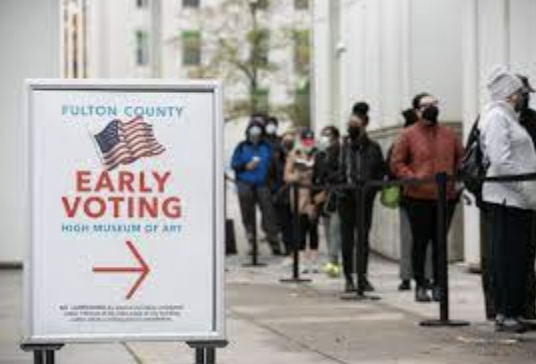Voting laws in Georgia spark controversy

Under the United States Constitution, the Fifteenth Amendment states, “The right of citizens of the United States to vote shall not be denied or abridged by the United States or by any State on account of race, color, or previous condition of servitude.”
This amendment gave men who were formerly enslaved the right to vote. Southern white government officials in the 1890s passed legislation to make voting for Black Americans more difficult, imposing poll taxes—a fee for voting. As well as introducing the grandfather clause making it where blacks could vote if their grandfather had, which was almost always impossible for blacks at that time.
The beginning of oppression of African Americans started in 1619 when Africans were enslaved by British and shipped to America. Many northern states in America had abolished slavery by the 18th century; however, this was hard for white southerners, concluding in the start of the American Civil War. Americans of color have been fighting for equal rights in American since they were forcefully brought here in 1619.
Recently, voting restrictions are being labeled “Jim Crow 2.0” or “Jim Crow on steroids.” Jim Crow was a post Civil War performer who mocked Black Americans while performing satire. Many segregation laws in the south were labeled “Jim Crow laws” during that time.
Those defending the recent voting restrictions say that the restrictions being compared to Jim Crow laws is too strong of a label.
In recent times, civil rights groups have recently stated they were suing the state of Georgia their recent changes to their voting laws. They said the change made it more difficult for all Georgia residents to vote, especially people of color.
Georgia’s recently enacted election law has had a lot of criticism due to the different perspectives it is being looked at. Those calling it a suppression act state how it is aimed at particularly the black community and other minorities to make it difficult for those to vote. This is shown in the part of this legislation where the bill makes it a misdemeanor to distribute food or drinks within 25 feet of voters standing in line at a voting place.
However, those not opposing the recent restrictions say that the attacks on the law are overblown and that the law actually expands ballot access.
Recently, leaders of three dozed Michigan based companies like General Motors and Ford have openly stated that they are opposed to election bills that would make it harder for Michigan citizens to vote.
“It’s our duty and responsibility to protect the integrity of every election.” Iowa Gov. Kim Reynolds said after signing a bill restricting voting policies earlier this year.
These recent restrictions similar to the ones Georgia and Texas have in place shorten the early voting period, limit drop box locations and restrict election officials from mailing absentee ballots unless voters request it, along with other measures.
Democrats opposing the Iowa bill believe that it is Republican-rooted, and Gov. Reynolds does not have every Iowans best interest in terms of voting, only Republicans.









You must be logged in to post a comment Login